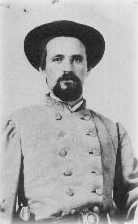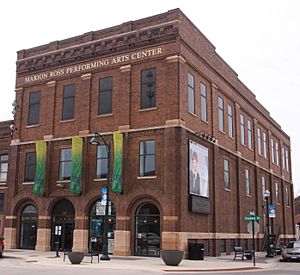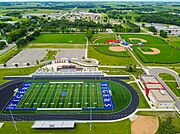Albert Lea, Minnesota facts for kids
Quick facts for kids
Albert Lea, Minnesota
|
|
|---|---|
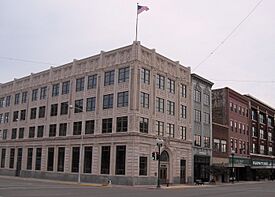
The historic downtown
|
|
| Motto(s):
Land Between the Lakes
|
|
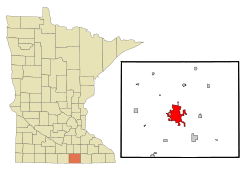
|
|
| Country | United States |
| State | Minnesota |
| County | Freeborn |
| Founded | 1855 |
| Incorporated (village) | 1859 |
| Incorporated (city) | 1878 |
| Area | |
| • City | 15.14 sq mi (39.21 km2) |
| • Land | 13.29 sq mi (34.42 km2) |
| • Water | 1.85 sq mi (4.79 km2) 12.69% |
| Elevation | 1,247 ft (380 m) |
| Population
(2020)
|
|
| • City | 18,492 |
| • Estimate
(2022)
|
18,396 |
| • Density | 1,391.53/sq mi (537.27/km2) |
| • Urban | 17,992 |
| • Metro | 30,718 (US: 428th) |
| • Demonym | Albert Leans |
| Time zone | UTC-6 (CST) |
| • Summer (DST) | UTC-5 (CDT) |
| ZIP Code |
56007
|
| Area code(s) | 507 |
| FIPS code | 27-00694 |
| GNIS feature ID | 2393902 |
Albert Lea (pronounced AL-bərt LEE) is a city in southern Minnesota. It is the main city of Freeborn County. In 2020, about 18,492 people lived there.
The city is located where two major highways, I-35 and I-90, meet. It is about 90 miles (145 km) south of the Twin Cities. Albert Lea is surrounded by several lakes, including Fountain Lake and Albert Lea Lake. These lakes are part of the Shell Rock River system.
Long ago, Albert Lea grew because of agriculture (farming) and manufacturing (making things). It was also a big center for trains. Many factories used to be here, like those making barn equipment and ice machines. A large meatpacking plant, Wilson & Company, was also a major employer. However, like many cities, Albert Lea has fewer factories now.
Contents
History of Albert Lea
The city gets its name from Albert Lea Lake. The lake was named after Albert Miller Lea. He was a surveyor with the U.S. Dragoons. In 1835, he explored southern Minnesota and northern Iowa, including the area where Albert Lea is today.
In 1959, the city gained national attention because of a long strike. Workers at the Wilson & Co. meatpacking plant went on strike. They were upset about having to work too much overtime. When the company tried to hire new workers, the situation became very tense. The governor of Minnesota, Orville Freeman, even had to close the plant and call in the National Guard to help keep peace. The strike lasted for 109 days.
Geography and Nature
Albert Lea covers about 14.42 square miles (37.35 km²). Most of this is land, but about 1.83 square miles (4.74 km²) is water. Myre-Big Island State Park is a state park located very close to the city.
The three main lakes in Albert Lea are Fountain Lake, Pickerel Lake, and Albert Lea Lake. These lakes offer beautiful views and outdoor activities.
Albert Lea's Climate
Albert Lea has a humid continental climate. This means it has cold winters and hot summers. The weather changes a lot between the seasons. Because it's in the southern part of Minnesota, its temperatures are generally warmer than cities further north in the state.
| Climate data for Albert Lea, Minnesota (1991–2020 normals, extremes 1885–present) | |||||||||||||
|---|---|---|---|---|---|---|---|---|---|---|---|---|---|
| Month | Jan | Feb | Mar | Apr | May | Jun | Jul | Aug | Sep | Oct | Nov | Dec | Year |
| Record high °F (°C) | 64 (18) |
64 (18) |
84 (29) |
94 (34) |
104 (40) |
104 (40) |
104 (40) |
101 (38) |
103 (39) |
94 (34) |
79 (26) |
67 (19) |
104 (40) |
| Mean maximum °F (°C) | 42.1 (5.6) |
46.3 (7.9) |
64.7 (18.2) |
79.7 (26.5) |
88.1 (31.2) |
92.2 (33.4) |
91.8 (33.2) |
89.5 (31.9) |
87.9 (31.1) |
81.8 (27.7) |
64.8 (18.2) |
46.6 (8.1) |
94.5 (34.7) |
| Mean daily maximum °F (°C) | 22.5 (−5.3) |
27.1 (−2.7) |
39.6 (4.2) |
55.1 (12.8) |
68.0 (20.0) |
78.3 (25.7) |
81.6 (27.6) |
79.2 (26.2) |
73.0 (22.8) |
58.9 (14.9) |
42.1 (5.6) |
28.3 (−2.1) |
54.5 (12.5) |
| Daily mean °F (°C) | 14.2 (−9.9) |
18.5 (−7.5) |
31.2 (−0.4) |
45.3 (7.4) |
58.1 (14.5) |
68.7 (20.4) |
72.0 (22.2) |
69.6 (20.9) |
62.0 (16.7) |
48.3 (9.1) |
33.7 (0.9) |
20.9 (−6.2) |
45.2 (7.3) |
| Mean daily minimum °F (°C) | 5.9 (−14.5) |
9.8 (−12.3) |
22.8 (−5.1) |
35.5 (1.9) |
48.1 (8.9) |
59.0 (15.0) |
62.5 (16.9) |
59.9 (15.5) |
51.1 (10.6) |
37.7 (3.2) |
25.3 (−3.7) |
13.4 (−10.3) |
35.9 (2.2) |
| Mean minimum °F (°C) | −16.2 (−26.8) |
−11.1 (−23.9) |
−0.2 (−17.9) |
20.9 (−6.2) |
33.8 (1.0) |
46.2 (7.9) |
52.2 (11.2) |
49.1 (9.5) |
35.9 (2.2) |
22.6 (−5.2) |
7.3 (−13.7) |
−8.7 (−22.6) |
−18.8 (−28.2) |
| Record low °F (°C) | −41 (−41) |
−33 (−36) |
−29 (−34) |
3 (−16) |
21 (−6) |
34 (1) |
42 (6) |
35 (2) |
22 (−6) |
−6 (−21) |
−18 (−28) |
−29 (−34) |
−41 (−41) |
| Average precipitation inches (mm) | 0.89 (23) |
0.87 (22) |
1.94 (49) |
3.74 (95) |
4.85 (123) |
5.44 (138) |
4.81 (122) |
4.27 (108) |
3.71 (94) |
2.58 (66) |
1.54 (39) |
1.13 (29) |
35.77 (909) |
| Average snowfall inches (cm) | 8.9 (23) |
9.8 (25) |
6.6 (17) |
2.8 (7.1) |
0.3 (0.76) |
0.0 (0.0) |
0.0 (0.0) |
0.0 (0.0) |
0.0 (0.0) |
0.3 (0.76) |
2.7 (6.9) |
8.1 (21) |
39.5 (100) |
| Average precipitation days (≥ 0.01 in) | 6.9 | 6.1 | 7.9 | 11.0 | 12.9 | 12.4 | 10.7 | 10.3 | 9.1 | 9.5 | 6.8 | 7.2 | 110.8 |
| Average snowy days (≥ 0.1 in) | 6.1 | 5.1 | 3.3 | 1.1 | 0.1 | 0.0 | 0.0 | 0.0 | 0.0 | 0.2 | 1.9 | 5.0 | 22.8 |
| Source: NOAA | |||||||||||||
People of Albert Lea
| Historical population | |||
|---|---|---|---|
| Census | Pop. | %± | |
| 1860 | 262 | — | |
| 1880 | 1,966 | — | |
| 1890 | 3,305 | 68.1% | |
| 1900 | 4,500 | 36.2% | |
| 1910 | 6,192 | 37.6% | |
| 1920 | 8,056 | 30.1% | |
| 1930 | 10,169 | 26.2% | |
| 1940 | 12,200 | 20.0% | |
| 1950 | 13,545 | 11.0% | |
| 1960 | 17,108 | 26.3% | |
| 1970 | 19,418 | 13.5% | |
| 1980 | 19,200 | −1.1% | |
| 1990 | 18,310 | −4.6% | |
| 2000 | 18,356 | 0.3% | |
| 2010 | 18,016 | −1.9% | |
| 2020 | 18,492 | 2.6% | |
| 2022 (est.) | 18,396 | 2.1% | |
| U.S. Decennial Census 2020 Census |
|||
A census is a count of all the people living in a place. The 2010 census showed that 18,016 people lived in Albert Lea. About 90% of the people were White. Other groups included African American, Native American, and Asian people. About 13.2% of the population was Hispanic or Latino.
In 2010, there were 7,774 households in the city. About 25.6% of these households had children under 18. The average age of people in Albert Lea was 44 years old.
Arts and Culture in Albert Lea
The Marion Ross Performing Arts Center is a special building in downtown Albert Lea. It has 255 seats and is used for plays, concerts, and meetings.
The Freeborn County Fair happens every year in Albert Lea. It features live music, an antique tractor show, and a fun midway with rides and food. Many famous country music bands have performed at the fair.
The Albert Lea Art Center also hosts many public events for people who love art.
Sports in Albert Lea
Albert Lea once had a junior hockey team called the Albert Lea Thunder. They played at the Albert Lea Ice Arena. The team was part of the North American Hockey League for two seasons, from 2008 to 2010. They stopped playing due to money problems.
Education in Albert Lea
Albert Lea has several schools for students of all ages.
- Elementary Schools: Halverson, Hawthorne, Lakeview, Sibley, and St. Theodore's Catholic School.
- Middle School: Southwest Middle School.
- High School: Albert Lea High School.
- Colleges: Riverland Community College offers higher education. Lea College also operated here from 1966 to 1973.
- Community Education: Albert Lea Community Ed provides learning opportunities for everyone.
Media in Albert Lea
The Albert Lea Tribune is the local newspaper. It was started in 1897 and is published Monday through Saturday.
There are also a few radio stations in Albert Lea:
- KATE (1450 AM) plays news and talk shows.
- KCPI (94.9 FM) is known as "94.9 The Breeze" and plays adult contemporary music.
- KQPR (96.1 FM) is called "Power 96" and plays classic rock music.
Transportation in Albert Lea
Local bus service in Albert Lea is provided by SMART (Southern Minnesota Area Rural Transit). SMART offers bus routes and special services for people who need them.
Notable People from Albert Lea
- Clare Hibbs Armstrong, a brigadier general during World War II
- Alfred Berglund, Minnesota state senator
- Tom Brown (Canadian football), a football star
- Richard Carlson, actor, writer, and director
- Vinny Cerrato, former general manager for the Washington Redskins football team
- Eddie Cochran, a famous rockabilly musician
- Robert Crumb, cartoonist and musician
- Al Franken, comedian and former U.S. Senator
- Alexander Grinager, an artist known for his murals
- Mary Kelly, a conceptual artist
- Jodi Jill, author
- John A. Lovely, Minnesota Supreme Court justice
- Marion Ross, actress from Happy Days
- Perry Saturn, professional wrestler
- William B. Sieglaff, U.S. Navy Admiral
- Ben Woodside, Professional Basketball Player
See also
 In Spanish: Albert Lea para niños
In Spanish: Albert Lea para niños
 | Jewel Prestage |
 | Ella Baker |
 | Fannie Lou Hamer |


